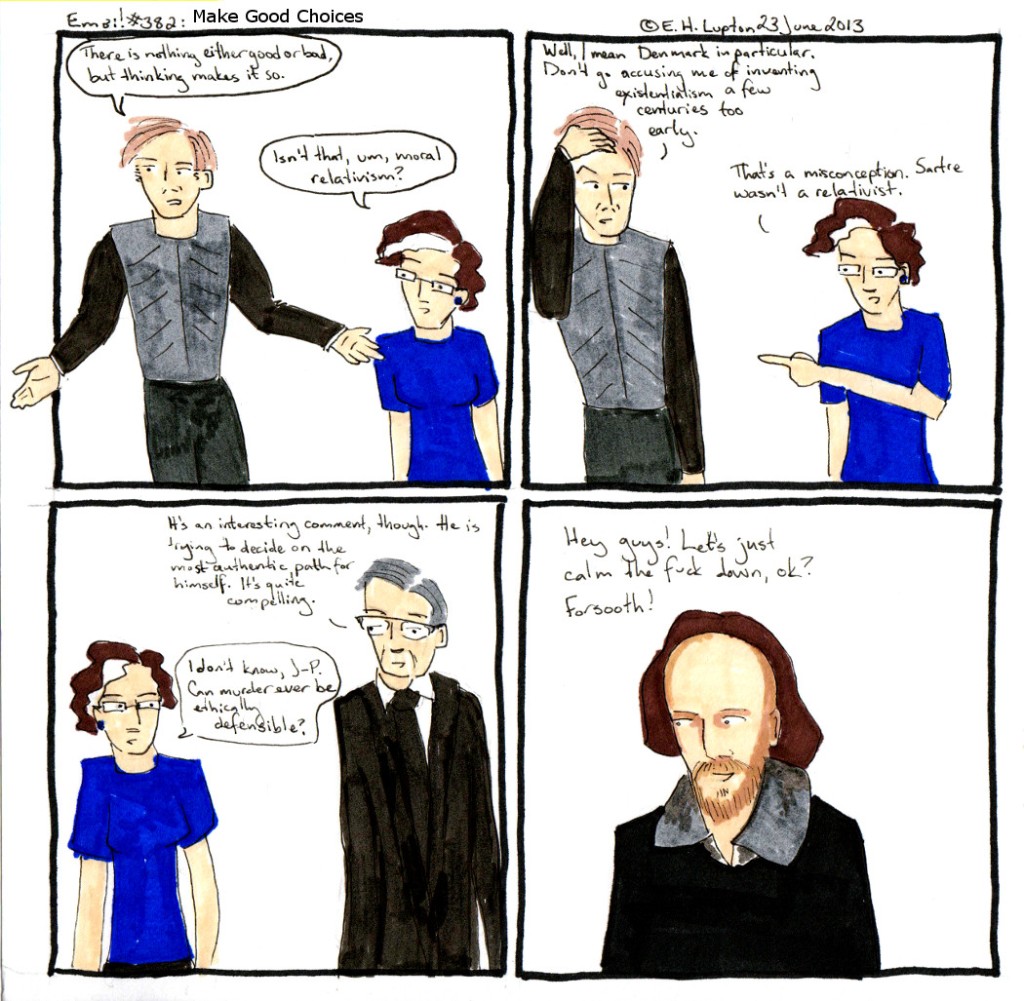We went and saw the new Hamlet out at American Player’s Theatre in honor of my cousin Keith graduating from his PhD program. It was a pretty good show–the fellow playing Hamlet reminded me of David Tennant’s Hamlet, to some extent, and the guy playing Polonius reminded me of Bill Murry’s turn at that role. Jim DeVita, who played Claudius, was quite good, and I was reminded of the first Hamlet I saw there, with Mr. DeVita in the title role then. Rosencrantz and Guildenstern were good and not portrayed as idiots, for once, which was very refreshing.
There were some more interesting things about the casting this time–for example, Horatio, Fortinbras, and a few other parts were played by African American actors; I don’t recall seeing that previously. It does kind of raise some other questions about race in casting (like: Couldn’t you cast a Black Hamlet?). But it’s a step, right?
The costumes were sort of surprisingly loud–the ball gowns and capes were made from some shiny material, maybe taffeta, and there wasn’t any wind, so as the actors went sweeping across the stage, we could hear the silken, sad, uncertain rustling. (And it didn’t thrill me.) But I do like a period dress Hamlet. I’ve been trying to put a finger on why modern-dress Shakespeare kind of bugs me, and I think it has something to do with the fact that when the actors are in modern dress, we have to pretend that the plays themselves are modern. What do I mean? Well, of course the plots are incredibly dynamic and, with a few exceptions, speak to us as much today as they did four hundred years ago. But not every sentiment in them is exactly an upstanding modern sentiment. For example: “Frailty, thy name is woman.” “Then weigh what loss your honour may sustain,/If with too credent ear you list his songs,/Or lose your heart, or your chaste treasure open/To his unmaster’d importunity.” Or how about Ophelia, speaking of the play, “Tis brief, my lord.” Hamlet: “As woman’s love.”
I could keep going, but I think I’ve made my point. I should add that I would rather see a modern dress anything than another “Hamlet wears tights and a dress tunic because that’s kind of like the way people dressed in the 1600s right?”
Interestingly, while I was drawing this comic, two people (neither of whom were aware of my researching J.P. Sartre) sent me the following joke:
Jean-Paul Sartre is sitting at a French cafe, revising his draft of Being and Nothingness. He says to the waitress, “I’d like a cup of coffee, please, with no cream.” The waitress replies, “I’m sorry, Monsieur, but we’re out of cream. How about with no milk?”
Why is this funny? Because Sartre focused on the idea of choice. His thing about “authenticity” was that everyone should live the life that they want, so long as they do not negatively affect/exploit others, replacing ego with a “spontaneous selfness” he refers to as “ipsity.” As part of being in the world, we are free; choices represent a problem because they limit our freedom. But in order to really make a choice, you can’t just follow the path of least resistance–you need to actually make a choice. Since there’s no cream, he can’t really choose not to have cream, since he couldn’t choose the opposite (to have cream). (Quote from The Stanford Encyclopedia of Philosophy. Wikipedia also has a nice summary.) Anyway, Hamlet’s choice to either get revenge or spare his father is problematic in Sartre’s terms.
This one is filed under PR2807.A8 L86 2013 for English literature–English renaissance (1500-1640)–The drama–Individual authors–Shakespeare, William–Separate works–Hamlet–Criticism.
The process of choosing titles is a bit troublesome. I almost went with “Authenticity” (after a Harvey Danger song) but only my brother S. would have gotten it, since he and I are the only remaining Harvey Danger fans. As it is, perhaps he will appreciate this one.
Anyway, changing topics, here is the first comic I ever drew with Shakespeare in it:
This one I’ll file under PN56.H83 L86 2013 for Literature (General)–Theory. Philosophy. Esthetics–Relation to and treatment of special elements, problems, and subjects–Other special–Topics A-Z–Humor.
Also you should know that the Library of Congress has reserved the heading BF1311.S5 for Parapsychology–Spiritualism. Communication with discarnate spirits–Mediumship. Psychometry. Channeling–Spirit messages, inspirational records, etc.–Special, A-Z–Shakespeare, William. So. You know. That.


